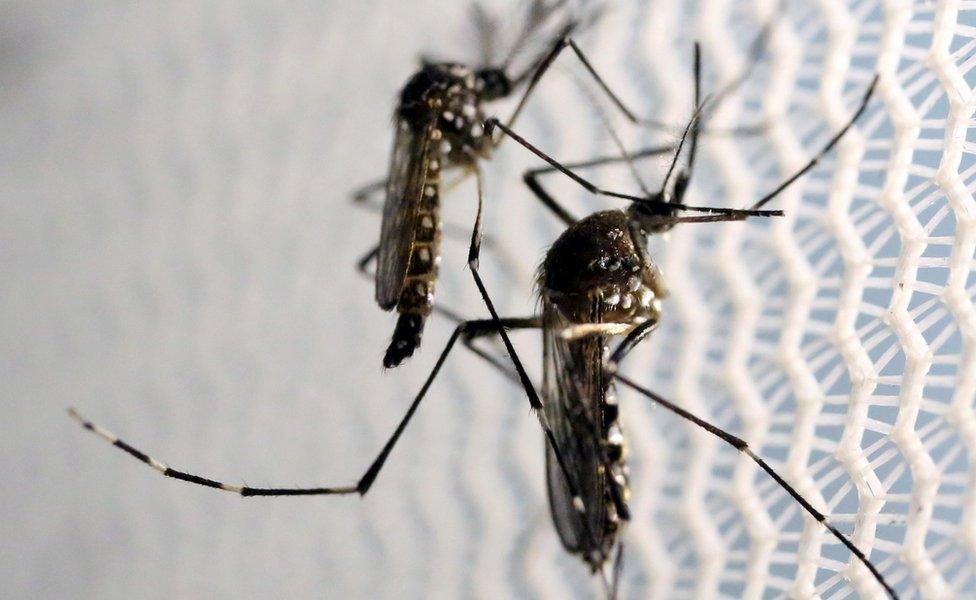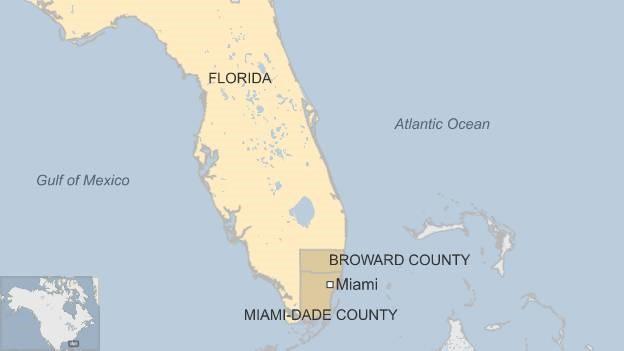Zika virus: Florida cases 'likely' to be first US-based infections
- Published

The Zika virus is spread by the aedes aegypti mosquito
Four people suffering from the Zika virus in Florida are probably the first cases contracted within the US, health officials say.
So far, cases outside of Latin America and the Caribbean, where the virus is prevalent, have been spread by travel to that region or sexual transmission.
The four Florida cases mean US mosquitoes may be carrying the virus.
Zika causes only a mild illness in most people but the virus has been linked to severe brain defects in newborns.
The Florida department of health said "a high likelihood exists that four cases are the result of local transmission", centred on one small area just north of downtown Miami.
More than 1,650 cases of Zika have so far been detected in the United States, external, but the Florida cases would be the first in the US not involving sexual contact or foreign travel.
"This is not just a Florida issue," Gov Rick Scott said. "It's a national issue - we just happen to be at the forefront."
In the latest reaction:
The Centers for Disease Control and Prevention (CDC) said they anticipated more cases will emerge over the coming weeks
CDC chief Tom Frieden said infection occurred "several weeks ago" and that there were no plans to restrict travel to Florida
The White House said President Obama had directed that all necessary resources be given to help Florida beat the virus
White House spokesman Eric Schultz repeated criticism of Congress for not agreeing to fund the fight against Zika before breaking for summer
The US Food and Drug Administration has asked for blood donation in both affected counties to be suspended, external
Gov Scott said all donations already made would now be tested for Zika
Two of those suffering from the virus are in Miami-Dade county and the other two in neighbouring Broward county. They are the most densely populated counties in Florida.
Gov Scott said the cases involved three men and a woman, and that none had been hospitalised.

Is there a risk of Zika in Europe?
To confirm whether Zika is being carried by mosquitoes locally, scientists are surveying houses and people within a 150-yard (metre) radius of the cases, the flying distance of the insect.
In February, the World Health Organization declared the Zika virus a global public health emergency because of the risk to newborn children.
In severe cases, children can die and babies who survive can face intellectual disability and developmental delays.
Gov Scott asked all residents of affected areas to get rid of standing water, where mosquitoes thrive, and for residents to wear insect repellent.

How Zika can spread

Bites from the aedes aegypti and aedes albopictus mosquitoes that carry the virus
Maternal transmission from mother to baby in the womb
Unprotected vaginal, oral or anal sexual intercourse - although rare, the virus can persist in semen
Zika virus has been found in other bodily fluids, including saliva and urine, but it is unknown whether it can spread through these routes
Blood transfusion - very likely but not confirmed
- Published30 July 2016
